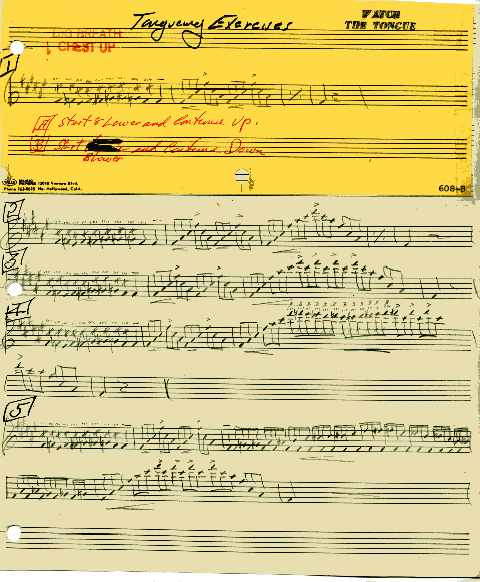Claude Gordon - Master Teacher (The Brass Herald)
I first met Claude in the summer of 1984 at his CG Brass Camp. I was immediately struck by his encouraging and positive attitude. He believed anyone could become a great player and accomplish what others said were only for a gifted few. He showed how all the great players played the same way in regards to fundamentals (i.e. defined as The Seven Basic Items) and that it could done by anyone.
I began private lessons with him on July 24, 1984 at age 16. I studied consistently over the next ten years and eventually became one of the staff at the CG Brass Camp.
At my first brass camp I learned about the Seven Basic Items. I then had an intellectual understanding of how things worked, but not a experiential understanding. The clarity of Claude’s words were only surpassed by his ability to apply it to each student. Often his words were limited and the routines walked me down the path of development. He was in touch with his students and their playing. He had experienced the same struggles and development and knew how to take students where he had been.
Claude believed in laws of nature that didn’t change. He often compared playing to flying. If we can have knowledge and confidence in a plane being able to fly, then we can have similar confidence in playing. This was why Claude knew that anyone could play this “piece of pipe” as he called the brass instruments.
Claude was a hard working man, teaching in San Francisco and Los Angeles, flying his plane between the two locations with periodic rests at his house in Big Bear Lake, California. At one point he used to teach non-stop from 8am until midnight eating in lessons as students brought him food. Claude sat at a desk when teaching. He was writing the assignments, watching the student play and taking some form of notes in his own book. In my ten years of study he never played one single note in a lesson, which may seem odd. But, he had lots of wisdom in knowing how to say a few clear important words that would set the student in the right direction. His comment about not playing was, “You are not paying me to play for you. You are paying me to teach you.” However, there were a few stories of students getting a demonstration from Claude when he saw fit that they needed proof that something was possible and easy if done properly.
Claude was very organized. Every practice assignment or “routine” was written down and put into a binder to be brought to every lesson. Things were spelled-out in great detail as to what to practice and in what order. I still refer to this binder of ten years of lessons and learn from it. Claude would often listen to the upcoming material and not hear all the previous material. He also had the wisdom and patience to know just how long to keep a student on a particular exercise until it accomplished what he was waiting for. I, like others, remember doing some of the same exercises for 8 months until finally the job was accomplished. He was clever to do subtle variations to keep things interesting for the student while reinforcing the desired effect.
Claude was a very determined and driven man that would never let any obstacle stop him or slow him down. He overcame quadruple bypass surgery and did a teaching video for the Selmer Company weeks after the surgery. He underwent radiation treatment for cancer and doubled the treatments to make it in time for his annual brass camp. He was eager to tell students that everything in Herbert L. Clarke’s Technical Studies could be played by anyone. If Clarke said to do an entire page in one breath (i.e. the Etude from the fifth study), then he would do it twice in one breath. He practiced his range studies from quadruple pedal C to triple high C and higher. He like Clarke urged students saying, “Do not stop where I’ve gone, but go farther.”
Every page ever assigned had reminders stamped onto them. The three rubber stamps he used said “Big Breath, Chest Up”, “Watch The Tongue” and “Lift Fingers High, Strike Valves Hard”. He was always optimistic, realistic and totally honest, not making unrealistic promises. He loved his students and it made him angry to see how brass players are taken advantage of and lied to. I always left lessons believing I could be a great trumpet player. His ability to motivate came from his belief in those Seven Basic Items and how they worked the same way for anyone.
In 1988 tragedy stuck Claude’s family. His wife, whom he’d been married to since 19 years of age died. Shortly after his two sons died and he developed cancer.
After overcoming this loss he started teaching again and I was able to take a brass pedagogy class with four other longtime CG students. The class lasted a year and we received unique instruction into why Claude taught the way he did. It was at that point I gained even more respect learning that there were so many things he noticed and knew that he wouldn’t let on to students. But, he knew how to correct things with the routines without letting the student worry, yet kept them focused on the fundamentals.

Creativity was one quality that Claude expressed in his various books. The routines would frequently have a series of handwritten exercises written by Claude. They would be tested on himself, then various students and then worked into the routines of other students when appropriate. Some of these turned into Claude’s well known published books. All of Claude’s material showed his step by step systematic approach.One of the secrets to Claude’s success was his wife. He married Genivieve (Ginny) days after meeting her. They were 19 years old and shortly after moved from Helena, Montana to Los Angeles in the midst of the depression era so that Claude could study with Clarke. Ginny was called “mom” by everyone as she added her personal touch. I still have her handwritten letters from my first brass camps. She took the time to get to know every student. She freed Claude from having to think about anything except playing and teaching. Ginny’s death was more challenging than his cancer battle and heart surgery ever was. After Ginny’s passing Claude married Patty, who took care of him in his last days and even learned some piano and music from him. Claude passed away on May 16th, 1996 at his Big Bear Lake, California home.
Upcoming articles will cover the teachings of Claude Gordon and Herbert L. Clarke including the Seven Basic Items and how to apply the teachings.
Jeff Purtle studied ten years with Claude Gordon, taught at the CG Brass Camps, and was certified directly by Dr. Gordon to teach according to his principles. Jeff has taught since 1984 and in 2004 added live video chat students to his Greenville, South Carolina studio.
Published by The Brass Herald - October 2008


